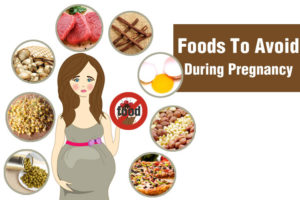Maintaining a Healthy Pregnancy
A woman’s health is essential to the good health of her baby. Now that you know you’re pregnant, it’s more important than ever to take care of yourself both physically and emotionally. You can boost your chances of having a problem-free pregnancy and a healthy baby.
Women who eat well and exercise regularly along with regular prenatal care are less likely to have complications during pregnancy. They’re also more likely to successfully give birth to a healthy baby.
Nutrition 
Now that you’re eating for two, you may be surprised to learn that you only need about 300 additional calories per day. Make sure you get plenty of protein. You now need 70 grams a day compared to 45 grams before you got pregnant. And while your calcium requirement remains the same, it’s more important than ever that you meet it, which is a challenge for many women.
Eating a nutritious diet during pregnancy is linked to good fetal brain development, a healthy birth weight, and it reduces the risk of many birth defects.
A balanced diet will also reduce the risks of anemia, as well as other unpleasant pregnancy symptoms such as fatigue and morning sickness. Good nutrition is thought to help balance mood swings and it may improve labor and delivery as well.
- At least five portions of fruit and vegetables daily. Fresh, frozen, canned, dried or juice all count.
- Starchy foods (carbohydrates), such as bread, pasta, and rice. Carbohydrates need to make up just over a third of what you eat. Choose whole grain varieties rather than white, so you get plenty of fiber.
- Daily servings of protein, such as fish, lean meat, eggs, beans, nuts or pulses.
- Dairy foods, such as milk, cheese, and yogurt.
- Two portions of fish a week, at least one of which should be oily, such as salmon, sardines or mackerel.
Fish is full of protein, vitamin D, minerals and omega-3 fatty acids, which are important for the development of your baby’s nervous system. If you don’t like fish, you can get omega-3 fatty acids from other foods, such as nuts, seeds, soya products and green leafy vegetables.
Stay well hydrated too. The amount of water in your body increases during pregnancy to help you maintain healthy blood pressure levels.
Weight gain
A simple way to satisfy your nutritional needs during pregnancy is to eat a variety of foods from each of the food groups every day.
Many women are concerned about how much weight they will gain during pregnancy. If your weight was in the normal range before you got pregnant, a weight gain of 25 to 35 pounds is recommended. It’s important to discuss and monitor your weight and nutritional needs with your doctor throughout the pregnancy. Weight gain recommendations will vary for women who are underweight before conceiving, for those who are obese, and for those with multiple pregnancies, such as twins.
What not to eat 
To protect mom and baby from bacteria or parasitic infection, such as Listeriosis, make sure that all milk, cheese, and juice are pasteurized. Don’t eat meat from the deli counter or hot dogs unless they are thoroughly heated. Also avoid refrigerated, smoked seafood and undercooked meat, poultry, and seafood. If you or someone in your family has had a history of allergies, speak to your doctor about any foods to avoid.
Prenatal vitamins 
Most nutrients needed during pregnancy should come from food, but prenatal vitamin supplements play an important role. Pregnant women are often too busy to plan three nutrient-filled meals every day, and a vitamin supplement can provide the extra nutrition that the developing fetus needs.
Folic acid (folate) is a B vitamin that is very important for pregnant women. Folic acid supplements are taken several weeks prior to pregnancy and for the first 12 weeks of pregnancy have been found to lower the risk of having a child with a neural tube defect such as spina bifida.
 Most prenatal vitamins contain 1 milligram of folic acid. Talk to your doctor before you start taking prenatal vitamins. They can help you decide which type is best for you.
Most prenatal vitamins contain 1 milligram of folic acid. Talk to your doctor before you start taking prenatal vitamins. They can help you decide which type is best for you.
You also need a daily supplement of 10mcg of vitamin D. Vitamin D is important for the development of your baby’s skeleton and future bone health.
If you’re worried you’re not eating well, or you’re too sick to eat much, you may want to take your folic acid and vitamin D in a multivitamin.
Exercise
Moderate exercise is not only considered safe for pregnant women, it’s encouraged and thought to benefit both mom and growing baby. Exercising 30 minutes a day is proven to help circulation, strengthen muscles, and decrease stress. However, it’s important to talk to your doctor before starting any exercise regime, particularly if you are in a high-risk category. If you were not physically active before getting pregnant, talk with your doctor about what exercise you can do during your pregnancy. 
For the majority of normal pregnancies, exercise can:
- increase energy levels
- improve sleep
- strengthen muscles and endurance
- reduce backaches
- relieve constipation
Aerobic exercises, such as walking, jogging, and swimming, stimulate the heart and lungs as well as muscle and joint activity, which help to process and utilize oxygen. Aerobic activity also improves circulation and increases muscle tone and strength.
There are many exercise classes designed specifically for pregnant women that help to build strength, improve posture and alignment, and promote better circulation and respiration.
Squatting and Kegel exercises should be added to the exercise routine. Kegel exercises focus on the vaginal and perineal muscles. The exercise is done in the same way a woman stops and starts the flow of urine. The perineal muscle is tightened for a count of three and then the muscle is slowly relaxed. The period of time the muscle is contracted can be increased over time as muscle control becomes easier. Relaxing the perineal muscles can help during the birth of the baby. Kegel exercises are thought to help women maintain good muscle tone and control in the perineal area, which can aid in delivery and recovery after birth.
A good exercise program can give you the strength and endurance you’ll need to carry the weight you gain during pregnancy, help prevent or ease aches and pains, improve sluggish circulation in your legs, and help you handle the physical stress of labor. It will also make getting back into shape after your baby’s born much easier.
Get some Rest
 The fatigue you feel in the first and third trimesters is your body’s way of telling you to slow down. So listen up and take it easy as much as you can. If you can’t swing a nap in the middle of the day, give yourself a break and let your other responsibilities slide a little. If you can’t sleep, at least put your feet up and read a book or leaf through a magazine.
The fatigue you feel in the first and third trimesters is your body’s way of telling you to slow down. So listen up and take it easy as much as you can. If you can’t swing a nap in the middle of the day, give yourself a break and let your other responsibilities slide a little. If you can’t sleep, at least put your feet up and read a book or leaf through a magazine.
Relaxation techniques such as yoga, stretching, deep breathing, and massage are all great ways to combat stress and get a better night’s sleep.
Cutting out BAD habits
- Say no to alcohol: Don’t drink while you’re pregnant: Any alcohol you drink reaches your baby rapidly through your bloodstream, crossing the placenta, and your baby can end up with higher levels of blood alcohol than you have. Drinking also increases your risk for miscarriage and stillbirth. So play it safe — avoid alcohol completely

- Swear off all illicit drugs: Any drug you use gets into your baby’s bloodstream as well. Some studies suggest that marijuana may restrict your baby’s growth and cause withdrawal symptoms (like tremors) in your newborn. Using cocaine is extremely dangerous. It restricts the flow of blood to the uterus and may lead to miscarriage, growth problems, placental abruption, or premature delivery. Your baby could be stillborn or have birth defects or developmental and behavioral problems.
 Stop smoking: Some research has even linked smoking to an increased risk of having a baby with a cleft lip or palate. Not convinced yet? Smoking during pregnancy increases the chance that a baby will be stillborn or die in infancy.
Stop smoking: Some research has even linked smoking to an increased risk of having a baby with a cleft lip or palate. Not convinced yet? Smoking during pregnancy increases the chance that a baby will be stillborn or die in infancy.- Cut back on caffeine: caffeine has no nutritive value and makes it harder for your body to absorb iron, something pregnant women are already low on. It’s also a stimulant, so it can make it even harder for you to get a good night’s sleep, give you headaches, and contribute to heartburn. Limit your coffee drinking or consider switching to decaf.
- Eliminate environmental dangers: Some jobs can be hazardous to you and your developing baby. If you’re routinely exposed to chemicals, heavy metals (like lead or mercury), certain biologic agents, or radiation, you’ll need to make some changes as soon as possible.
Take care of your emotional health
Many women feel like they’re on an emotional roller coaster at one time or another during pregnancy. But if your mood swings are extreme or interfering with your daily life, you may be suffering from depression, a relatively common condition. Share your feelings with your caregiver so you can get a referral for professional help.
The information, including but not limited to, text, graphics, images and other material contained on this website are for informational purposes only. The purpose of this website is to promote broad consumer understanding and knowledge of various health topics. It is not intended to be a substitute for professional medical advice, diagnosis or treatment. Always seek the advice of your physician or another qualified healthcare provider with any questions you may have regarding a medical condition or treatment and before undertaking a new health care regimen, and never disregard professional medical advice or delay in seeking it because of something you have read on this website.
Resources: https://www.healthline.com/health/pregnancy/healthy-pregnancy#prenatal-care




Leave a Reply
Want to join the discussion?Feel free to contribute!